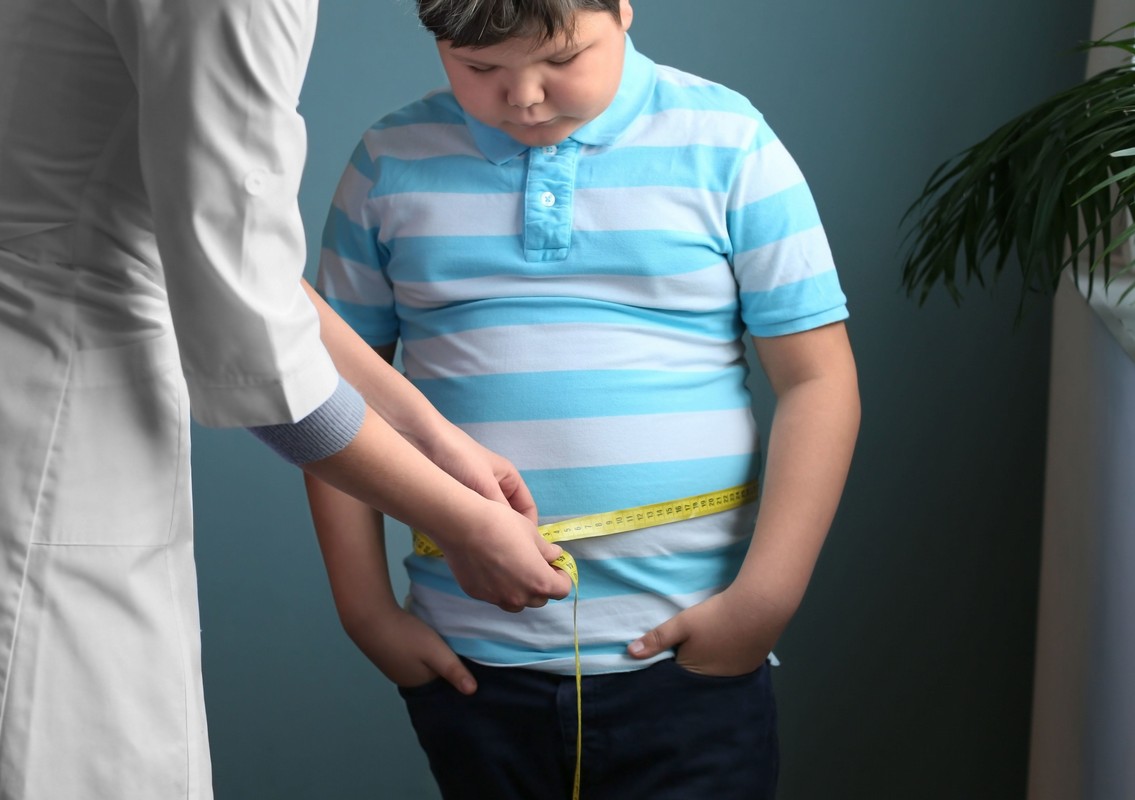
The Potential Complications of Childhood Obesity
There are many complications and negative impacts of obesity in children, a condition which is so common that it is a nationwide pediatric health concern. Understanding the health risks and causes of childhood obesity will help you know when to discuss your child’s weight with your pediatric doctor.
Looking deeper into this complex issue can help you determine the causes, impacts, and prevention strategies that can help young people overcome this growing condition.
What Is the Definition of Childhood Obesity?
The medical definition of obesity has changed over time but is typically used when a person’s BMI (body mass index) is at or above the 95th percentile for their age. This aligns with body fat percentages of more than 25% for males and 30% for females.1
BMI is not always an accurate marker for children who have rapidly changing body shapes due to normal growth patterns. Some muscular children with large frames may have a high BMI, even though their body fat percentage may be normal.
There are more accurate ways to measure body fat ratios for clinical purposes, but, for general screening, a BIA (bioelectrical impedance analysis) test offers more accurate results, especially when combined with waist circumference measurements.1
What Are the Risks of Childhood Obesity?
The impacts of obesity during childhood are far-ranging, going beyond the obvious health risks, to impact all areas of life. Pediatric physicians are aware of the implications of carrying significant extra weight on a developing frame, as well as the social, educational, and mental health risks that go hand in hand with obesity.
The Physical Health Impacts of Obesity in Childhood
The possible consequences of obesity to a child’s health are wide-ranging; some appear immediately while others take time to develop. Some of the health conditions overweight children face include:1
- Insulin resistance
- Metabolic syndrome
- Skin conditions
- Glucose intolerance
- Menstrual cycle abnormalities
- Orthopedic (bone) problems, including increased risk of fractures
- Fatty liver disease
- Heart disease
- High cholesterol
- High blood pressure
- Gallstones
- Asthma
- Type 2 diabetes
- Sleep apnea
The Social and Emotional Impacts of Childhood Obesity
Being overweight has significant and well-researched effects on social development and emotional growth. Children who are obese are more likely to encounter these challenges and can benefit from specialist referrals from their pediatric doctor to overcome:1
- Low self-esteem
- Negative body image
- Eating disorders
- Bullying
- Withdrawal or isolation
- Depression or anxiety
- Poor social skills
- Discrimination and social marginalization
- Disruptive behavior in school or at home
The Educational Impacts
Research also shows that childhood obesity has a negative effect on academic performance, indicating that children who are obese or overweight are four times more likely to report problems at school than those of average weight.1 They were also more likely to be absent, possibly due to fear of bullying or the health complications caused by their excess weight.
What Are the Causes of Obesity in Children?
The factors that contribute to obesity in childhood are as varied as the health consequences that result. Some of these factors are physical, others are cultural, and some are lifestyle choices.
Understanding how these influences work together to create an unhealthy balance between food consumption and energy spent will shed light on why childhood obesity is becoming more and more common throughout developed countries:
- Genetics. Evidence shows that a high BMI is an inherited trait, with obesity running in families even in the absence of a shared environment or lifestyle. This accounts for approximately 5% of cases.1
- Basal metabolic rate. The rate at which the body burns calories at rest. We burn 60% of our calories in supporting body functions like breathing or digesting food, and some people burn more calories than others, even when resting.1
- Environment. Factors like demographics, school policies, family stress, and parent’s work schedules can influence eating and activity levels, contributing to obesity.
- Family or cultural factors. Celebrations which center on high-calorie foods or learned eating behaviors, including treating emotions with comfort food, binge eating, or late-night snacking, all contribute to taking in more calories than are being expended.
- Economic realities. Some communities offer little access to fresh foods and affordable groceries, leaving residents with limited financial resources to depend heavily on convenience foods, snack foods, or boxed meals to feed their children.
- Fast food consumption. Regular consumption of fast food is known to cause weight gain because menu items are typically much higher in fat and calories than the same item prepared at home.1
- Sugary drinks. One of the fastest ways to consume calories without feeling full is through sugary drinks, which include soda, juices, and energy drinks. These extra calories can sneak up on children and adults leading to weight gain.
- Portion sizes. In the past 15 years, portion sizes have increased drastically. Portions in the United States are often twice the size of normal portions in other countries.
- Activity levels. Children spend more time watching TV, playing electronic games, and sitting still in school or at home than they did in the past. These activities are also often paired with snacking, leading to an even greater imbalance between diet and exercise.
- Safety concerns. One of the reasons children spend so much time in sedentary activities is because of our concerns about their safety. The majority of parents report that they drive their children to school, and many live in unsafe neighborhoods without access to safe play spaces.1

Childhood Obesity Prevention and Treatment
It is often the role of a pediatric doctor to talk with you and your children about the risks and complications associated with obesity. Being open to this discussion and supportive of treatment recommendations that might affect the entire family is often the most meaningful action you can take to help your child who is struggling with their weight.
Some tips to help prevent and reverse childhood obesity include:
- Eating meals which include plenty of fruits and vegetables as a family
- Limiting availability of high-calorie snacks and sugary drinks in the house
- Modeling healthy eating behaviors and teaming up to reverse family obesity
- Exercising together or providing fun opportunities to exercise with peers who are supportive
- Limiting screen time to encourage more physical types of play
- Participating in family games or chores which naturally improve fitness
- Setting fitness goals and rewarding healthy decisions with non-food incentives
- Adjusting portion sizes and portioning snack foods, rather than serving from the box or bag
- Meeting with your pediatrician regularly, and consulting with a dietitian for additional resources if needed
Keep in mind that diets which offer few choices and severely limit “junk food” are associated with an increased desire for unhealthy foods2 and may cause secret eating. It is important to positively engage with your child about their food choices and reward healthy decisions, rather than seek to enforce a restrictive treatment plan.
When Should You Consult a Pediatric Specialist About Your Child’s Weight?
Your primary care physician or school health care services may discuss concerns that your child is meeting markers of being overweight, or you might simply want to be sure that a sudden or significant weight gain does not have a medical cause.
Your doctor will review your child’s growth charts, BMI scores, and your family’s history of weight to height to understand what is normal for your child. If needed, they will run any necessary tests to ensure that disease causes of weight gain or inactivity are ruled out. Then they will help develop a treatment plan and offer exercise, dietary, and counseling resources that can help.

Empowering Your Child to Lose Weight the Right Way
Like all medical conditions, childhood obesity can be treated effectively when all the contributing factors are identified and the right treatment plan is followed. The team of pediatric specialists at Crystal Run Healthcare seek to understand the complex causes of obesity and the individual needs of our patients before recommending the best possible treatment plan.
Severely limiting calories can have negative impacts on growing children, who need a balanced diet that includes healthy fats and mineral sources. While medical guidance can be helpful for adults to achieve significant weight loss, it is extremely important for young people. Before putting your child on a restrictive diet, be sure to consult with your pediatrician.
If there are any contributing medical conditions, these can be found and treated before they impact healthy growth and social development. We can also recommend:
- Wellness strategies
- Supportive services
- Youth-focused fitness groups
- Healthy eating programs
- Meal replacement programs
- Recommended nutritional supplements
The risk factors and complications of obesity at an early age can be effectively reversed for most children with nutritional guidance and lifestyle changes. Knowing that your child has all the tools and support they need as they return to a healthy weight might even inspire other family members to join them in making these important changes.
Protecting your child's health for tomorrow and long into the future is our shared goal, so if you or your doctor are concerned about your child’s weight, contact us today for a consultation.
Sources:
1. https://www.ncbi.nlm.nih.gov/pmc/articles/PMC4408699/
2. https://www.mayoclinic.org/diseases-conditions/childhood-obesity/symptoms-causes/syc-20354827

 Optum Radiology at Crystal Run Healthcare
Optum Radiology at Crystal Run Healthcare Request medical records online
Request medical records online